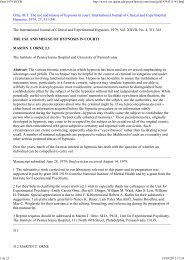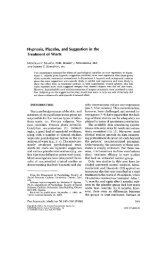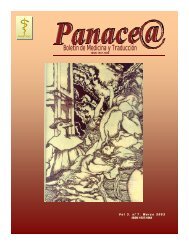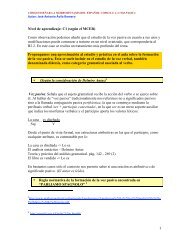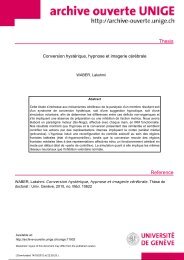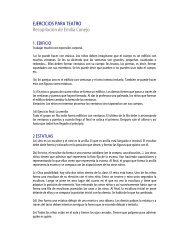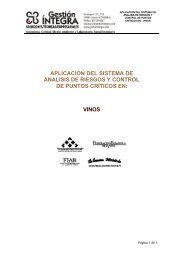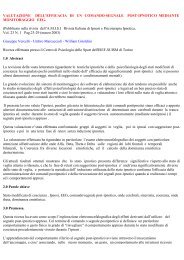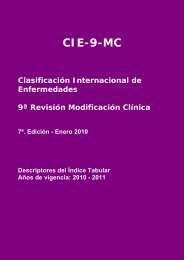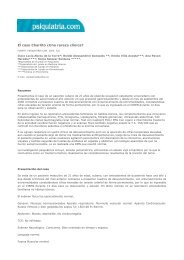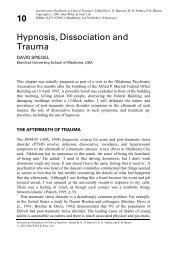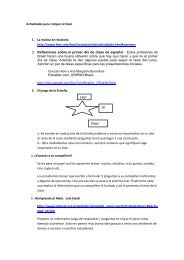Diccionario etimológico comparado de la lengua castellana
Diccionario etimológico comparado de la lengua castellana
Diccionario etimológico comparado de la lengua castellana
You also want an ePaper? Increase the reach of your titles
YUMPU automatically turns print PDFs into web optimized ePapers that Google loves.
FAUCÉ FAVO 2569<br />
Acuérdate siempre <strong>de</strong> <strong>la</strong> <strong>de</strong>sdicha <strong>de</strong> aquel<strong>la</strong>s vírglnes<br />
impru<strong>de</strong>ntes y fatuas. M. Aj/red. tom 1, núm. 649.<br />
2. Lleno <strong>de</strong> presunción ó vanidad infundada<br />
y ridicu<strong>la</strong>. Ú. t. c. s.<br />
Sin.— Fatuo.— Impertinente— Necio.<br />
El epíteto fatuo <strong>de</strong>pen<strong>de</strong> mas bien <strong>de</strong>l interior <strong>de</strong>l<br />
hombre, que <strong>de</strong> <strong>la</strong>s maneras exteriores, á que se acer<br />
can mas inmediatamente los dos siguientes, impertinente<br />
y necio.<br />
El fatuo hab<strong>la</strong> mucho y con cierto tono que le es peculiar,<br />
no sabe nada, y se le figura que lo sabe todo, se<br />
escucha á sí propio y se admira. La vanidad y el <strong>de</strong>saire<br />
son su norte. El impertinente hab<strong>la</strong> también mucho<br />
como el fatuo, sus dichos son <strong>de</strong>spropósitos, sin<br />
consi<strong>de</strong>ración y sin miramiento, confun<strong>de</strong> <strong>la</strong> honestidad<br />
con el libertinaje, con una familiaridad extremada,<br />
hab<strong>la</strong> y obra con una <strong>de</strong>svergüenza insolente: es un<br />
fatuo mas arrojado.<br />
Inútiles son todas <strong>la</strong>s lecciones que se pue<strong>de</strong>n dar á<br />
un necio, porque <strong>la</strong> naturaleza le ha rehusado el don <strong>de</strong><br />
aprovechar<strong>la</strong>s. El necio carece <strong>de</strong> lo que es necesario<br />
para ser un fatuo.<br />
El necio es siempre ridículo, y por consiguiente merece<br />
el <strong>de</strong>sprecio.<br />
El fatuo cansa y disgusta.<br />
El impertinente ofen<strong>de</strong>, irrita y <strong>de</strong>sespera.<br />
Al fatuo le convence el tiempo <strong>de</strong> su extravagancia y<br />
su vanagloria.<br />
Fauces, f. pl.<br />
ETIM.—Del <strong>la</strong>tino fauc-es, fauc-i-um<br />
(|)1.), <strong>la</strong>s fauces, el garguero ó gorja<br />
(Summum gu<strong>la</strong>e fauces vocantur, extremum<br />
stomachus. Plin. 11. 37. 149),<br />
El singu<strong>la</strong>r faux no está en uso. Para<br />
<strong>la</strong> etim. <strong>de</strong> fauces cfr. so-foc-ar. Cfr.<br />
i tal.<br />
etc.<br />
fauci. Cfr. sofocación, sofocante,<br />
SIGN.— Parte posterior <strong>de</strong> <strong>la</strong> boca, que se<br />
extien<strong>de</strong> <strong>de</strong>s<strong>de</strong> el velo <strong>de</strong>l pa<strong>la</strong>dar hasta el<br />
principio <strong>de</strong>l esófago:<br />
Toma esa vara y con el<strong>la</strong> Sacu<strong>de</strong> aquel<strong>la</strong>s gargantas<br />
Y essas /"aMCís . . . Cald Com. «Andr. y Perseo». Jorn. 2.<br />
Fauna, f.<br />
Cfr. etim. fauno.<br />
SIGN.— 1. Conjunto <strong>de</strong> los animales <strong>de</strong> un<br />
país ó región.<br />
2. Obra que los enumera y <strong>de</strong>scribe.<br />
Fau-no. m.<br />
ETIM.— Del <strong>la</strong>t. Fau-nu-s, Fauno, el<br />
mismo que Fatuus, Faíuellus^ Pan.,<br />
Aegipan^ Silvanus., Inrxus, hijo <strong>de</strong> Pico,<br />
nieto <strong>de</strong> Saturno y rey <strong>de</strong> los aborígenes.<br />
Fué consagrado por dios <strong>de</strong>spués<br />
<strong>de</strong> su muerte. Plural Fauni, -orum,<br />
Faunos, Panes, Sátiros, Silvanos; hijos<br />
<strong>de</strong> Fauno ó <strong>de</strong> Saturno; dioses <strong>de</strong> los<br />
campos, montes y selvas. Derívase faunus<br />
<strong>de</strong>l primit. fav-nus, cuya raíz fav-,<br />
favorecer, amparar, socorrer y sus aplicaciones<br />
cfr. en fábu<strong>la</strong>. Etimol. fau-no<br />
significa dios protectoj\ De fauno <strong>de</strong>scien<strong>de</strong><br />
fauna (cfr.), que etimol. significa<br />
conjunto <strong>de</strong> sátiros, silóanos y luego<br />
<strong>de</strong> animales en general <strong>de</strong> un país ó<br />
región. De <strong>la</strong> misma raíz fav- <strong>de</strong>scien<strong>de</strong>n:<br />
ybc-or, -or-is, -o/'-em, primitivo <strong>de</strong><br />
FAVOR y éste <strong>de</strong> favor-ecer- (cfr. suf.<br />
-ecerj; faü-il-<strong>la</strong>^ ceniza caliente, bi-asa,<br />
humo; primit. <strong>de</strong> favi<strong>la</strong> (cfr.); fau-tor<br />
(=fav-tor)., favorecedor, prim. <strong>de</strong> fautor<br />
y éste <strong>de</strong> fau-tor-ía; fav-on-ius,<br />
l)rimit. <strong>de</strong> favonio; faüor-a-bilis, -bile,<br />
primit. <strong>de</strong> favorable y éste <strong>de</strong> favorablemente.<br />
De favor <strong>de</strong>scien<strong>de</strong>n faüor-idoy<br />
faüor-ito^ favor-it-ismo y <strong>de</strong><br />
fciüor-ecer se <strong>de</strong>rivan favoreciente y<br />
favorecedor. Le correspon<strong>de</strong>n: italiano<br />
fauno; franc. faunus, faune; cat. fauno;<br />
port. fauno, etc. Cfr. fomiínto, festivo,<br />
etc.<br />
SFGN.<br />
— :<br />
Mit. Semidiós <strong>de</strong> los campos y sel-<br />
vas :<br />
Falláron<strong>la</strong> los homes montesinos, que son llámalos<br />
sátyros é faunos. Chron. Gen. f. 193.<br />
Fausto, m.<br />
Cfr. etim. fastidio.<br />
SIGN.— Gran<strong>de</strong> ornato y pompa exterior;<br />
lujo extraordinario :<br />
Si un mundano viene á pobre revienta y mue-e por<br />
sustentar fatisto <strong>de</strong> rico. Fons. A. <strong>de</strong> D. p. 1, cap. 37.<br />
Faus-to, ta. adj.<br />
Cfr. etim.. fábu<strong>la</strong>.<br />
SIGN.— Feliz, afortunado:<br />
Verás, verás sin duda De Amarilis el parto en<br />
fausto día. L. Arg. R. f, 127.<br />
Faust-oso, osa. adj.<br />
Cfr. etim. fausto, 1.°. Suf. -oso.<br />
SIGN.— FASTUOSO.<br />
Fau-tor, tora. m. y f.<br />
Cfr. etim. fauno. Suf. -tor.<br />
SIGN.—El que favorece y ayuda á otro.<br />
Hoy se usa más generalmente en ma<strong>la</strong> parte:<br />
Para acabar <strong>de</strong>l todo estos monstruos, contra ellos y<br />
sus fautores. Fuen. S. P. V. f. 36.<br />
Fautor-ía. f.<br />
Cfr. etim. fautor. Suf. -ía.<br />
SIGN.— FAVOR, 1.' acep,<br />
Fav-il-<strong>la</strong>. f.<br />
Cfr. etim. fauno.<br />
SIGN.— poét. Pavesa ó ceniza <strong>de</strong>l fuego<br />
apagado<br />
De pez fogosa y <strong>de</strong> favi<strong>la</strong> ardiente. PeU. Arg. par.<br />
2. f. 49.<br />
Fav-o. m.<br />
ETIM.— Del <strong>la</strong>t. fav-us, -/, el panal<br />
<strong>de</strong> cera, compuesto <strong>de</strong>. varias celdil<strong>la</strong>s,<br />
en que <strong>la</strong>s abejas <strong>la</strong>bran <strong>la</strong> miel; <strong>la</strong><br />
miel; <strong>de</strong>rivado <strong>de</strong>l primit. * fau-us, <strong>de</strong><br />
<strong>la</strong> raíz fu- (amplificada por gunación en<br />
FAU-), correspondiente á <strong>la</strong> indo-europea<br />
bhu-, crecer, tomar aumento, criarse;<br />
ser, existir, formarse; hacer criar, formar,<br />
crecer, producir, etc.; cuya aplicación<br />
cfr. en tri-bu-to. Etindológ. signi-<br />
M. Ca<strong>la</strong>ndrelli. 259.



